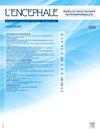抗药性抑郁症患者的认知障碍和治疗反应。
IF 1
4区 医学
Q4 NEUROSCIENCES
Encephale-Revue De Psychiatrie Clinique Biologique et Therapeutique
Pub Date : 2024-05-07
DOI:10.1016/j.encep.2024.02.002
引用次数: 0
摘要
目标:抑郁症的治疗反应是一项重大挑战,因为超过三分之一的患者在尝试两次抗抑郁治疗后病情仍未缓解,并会出现治疗耐受性抑郁症。为了更好地调整针对耐药患者的治疗策略,仍需确定治疗反应的预测指标和标记。与此同时,抑郁症患者的认知功能也会出现障碍。本研究旨在描述和比较在纳入治疗耐受性抑郁症患者时收集到的认知表现,这些患者将在 6 个月后对治疗做出反应,而非未做出反应者,并评估认知指标对治疗调整后 6 个月临床治疗反应的预测价值:观察研究。方法:观察性研究。在改变抗抑郁治疗前,使用评估记忆、执行功能、注意力和社会认知的标准化工具对患者进行临床(HDRS和BDI-II)和认知水平评估。入组 6 个月后,根据治疗反应的有无(以 HDRS 和 BDI-II 改善 50%为标准)对患者进行重新评估,并将其分为两组。然后对纳入时收集的认知评分进行比较。此外,还使用了单变量逻辑回归模型:本研究共纳入了 30 名患者。只有 13 名患者能在 6 个月时接受评估。在这些患者中,4 人对新疗法有反应,9 人无反应。在评估执行功能和注意力的测试中,两组患者的认知表现与常模相比均有偏差。统计分析表明,在 6 个月时,有反应者和无反应者的认知表现没有任何差异。回归分析表明,6 个月时的认知评分与治疗反应之间没有关联:结论:执行功能在耐药性抑郁症中起着重要作用。为了更好地理解和识别抑郁症的亚型,认知指标应系统地纳入未来的研究中。本文章由计算机程序翻译,如有差异,请以英文原文为准。
Cognitive impairment and therapeutic response in resistant depression
Objectives
Therapeutic response in depression is a major challenge since more than one third of patients are not in remission after two attempts of antidepressant treatment and will present a treatment-resistant depression. In order to better adapt therapeutic strategies for treatment-resistant patients, predictive indicators and markers of therapeutic response still need to be identified. In parallel, patients with depression exhibit disturbances in cognitive functioning. This study aims to describe and compare cognitive performances collected at inclusion of patients presenting treatment-resistant depression who will be responders at 6 months to those of non-responders, and to evaluate the predictive value of cognitive indicators on clinical therapeutic response at 6 months after a therapeutic modification.
Methods
Observational study. Patients were evaluated at the clinical (HDRS and BDI-II) and cognitive levels using standardized tools assessing memory, executive functions, attention, and social cognition, prior to a change in antidepressant treatment. Six months after inclusion, they were reassessed and classified into two groups based on the presence or absence of therapeutic response, defined by a 50% improvement on HDRS and BDI-II. The cognitive scores collected at inclusion were then compared. Additionally, univariate logistic regression models were used.
Results
Thirty patients were included in this study. Only 13 could be evaluated at 6 months. Among these patients, four had responded to the new treatment while nine were non-responders. Both groups of patients presented deviant cognitive performances compared to norms on tests evaluating executive functions and attention. Statistical analyses did not reveal any difference between the cognitive performances of responders and non-responders at 6 months. Regression analyses showed no association between cognitive scores and therapeutic response at 6 months.
Conclusion
Executive functioning plays a significant role in treatment-resistant depression. In order to improve the understanding and identification of subtypes of depression, cognitive indicators should be systematically integrated into future research.
求助全文
通过发布文献求助,成功后即可免费获取论文全文。
去求助
来源期刊
CiteScore
4.60
自引率
7.40%
发文量
162
审稿时长
6-12 weeks
期刊介绍:
Une revue française de renommée internationale.
- Un comite de rédaction représentant tous les aspects de la prise en charge psychiatrique du patient.
- Une sélection rigoureuse d''articles faisant l''objet de plusieurs expertises.
- Des travaux d''auteurs et de chercheurs de renommée internationale.
- Des indexations dans les grandes bases de données (Current Contents, Excerpta Medica, etc.).
- Un facteur d''impact qui témoigne de la grande notoriété de la revue.
La tribune des publications originales de haut niveau.
- Une très grande diversité des sujets traités, rigoureusement sélectionnés à travers des sommaires dynamiques :
- des éditoriaux de médecins référents,
- une revue de presse sur les actualités internationales,
- des articles originaux pour approfondir vos connaissances,
- des mises au point et des cas cliniques pour engager votre réflexion sur les indications et choix possibles au travers de mises en situation clinique,
- des dossiers thématiques pour faire le tour d''une question.
- L''actualité de l''AFPB : L''Encéphale publie régulièrement des comptes rendus de l''Association française de psychiatrie clinique.

 求助内容:
求助内容: 应助结果提醒方式:
应助结果提醒方式:


